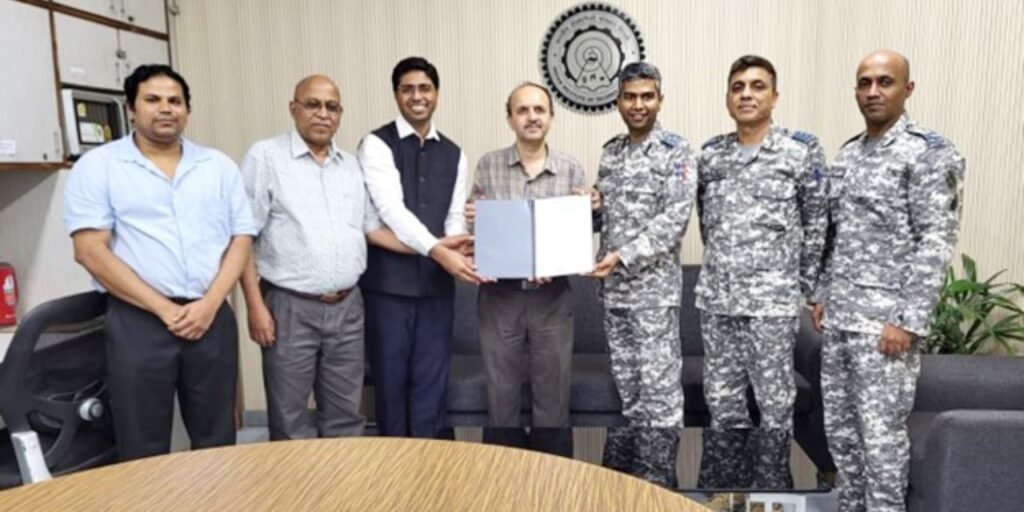
(Photo: Left to Right: Wing Commander Arun Manohar (Chief of Quality Assurance), Group Captain Prashant Pathak (Commanding Officer 16 BRD, IAF), Group Captain Asit Kumar (Chief of Planning & Production 16 BRD, IAF), Prof. Sohel Rana, Prof. R. Alagirusamy (HoD, Textile and Fibre Engg. Dept., IIT Delhi), Prof. Bipin Kumar (Project Coordinator, IIT Delhi), and Prof. Rajendra Singh (Associate Dean, R&D, IIT Delhi).
New Delhi: To work together on developing cutting-edge technologies for aviation textiles, Headquarters Maintenance (HQ) Command, Indian Air Force Nagpur, and IIT Delhi have inked a Memorandum of Understanding (MoU).
The MoU was signed by Prof. Naresh Bhatnagar, Dean (R&D), IIT Delhi, and Group Captain Prashant Pathak (Commanding Officer 16 BRD, AF) in the presence of Prof. R. Alagirusamy, HoD, Textile and Fibre Engg. Dept., IIT Delhi, and Prof. Bipin Kumar, Project Coordinator, IIT Delhi, Group Captain Asit Kumar (Chief of Planning & Production 16 BRD, AF) and Wing Commander Arun Manohar (Chief of Quality Assurance 16 BRD, AF).
Under the terms of the Memorandum of Understanding, IIT Delhi and IAF Nagpur’s Headquarters Maintenance will work together and support research and development in the fields of aviation-grade textiles obsolescence management, self-reliance, upgrades, and digitisation through indigenisation.
Among the areas of interest for cooperation are the following, per Group Captain Prashant Pathak, Commanding Officer 16 BRD, AF:
- Selection of raw materials (fabric/textile) for different safety and parachute equipment.
- creation of cutting-edge tools and methods for technical textile and fabric testing, as well as the most recent standards that may be included into parachute and safety equipment product designs.
- using robotics, artificial intelligence, or imaging technology to verify the quality of textiles, fabric raw materials, and final goods.
- Create new machine learning-based imaging technologies for completed items that are received from field units for repair, such as pilot parachute/braking parachute or cargo parachute canopies, related harnesses and crew restraint systems.
- Parachutist and related accessory design and development, dependability, simulation, and life extension research.
The significance of this collaboration in meeting the increasing need for indigenisation in the Indian military industry was underlined by Prof. Rajendra Singh, Associate Dean, R&D, IIT Delhi. He emphasised how IIT Delhi’s cutting-edge research and IAF’s real-world experience might be used to create novel solutions for a variety of textile goods of aviation quality.
The collaboration between IIT Delhi and HQ Maintenance, IAF Nagpur, is anticipated to help India become more self-sufficient in military technology, according to Prof. Bipin Kumar, Project Coordinator from the Department of Textile and Fibre Engineering, IIT Delhi.
Researchers from the Indian Institute of Technology (IIT) Delhi and the Defence Research & Development Organisation (DRDO) have created lightweight bulletproof jackets called ABHED (Advanced Ballistics for High Energy Defeat). The DRDO Industry Academia Centre of Excellence (DIA-CoE) at IIT Delhi is where the jackets were created.

Polymers and local boron carbide ceramic material were used to make these jackets. Characterisation of different materials at high strain rates, followed by suitable modelling and simulation in cooperation with DRDO, forms the basis of the design configuration.
According to the procedures, the jackets’ armour plates have successfully completed all required R&D tests. The jackets are lighter than the maximum weight limitations specified in the corresponding General Staff Qualitative Requirement of the Indian Army and satisfy the highest danger levels. These modular-design jackets with front and back armour offer 360-degree protection, with minimum weights of 8.2 kg and 9.5 kg for various BIS Levels.
A few Indian firms were identified for technology transfer and handholding based on the selection criteria matrix. Three industry are prepared to receive technological transfers from the Centre.
Congratulating DIA-CoE on the achievement, Secretary, Department of Defence R&D and Chairman DRDO Dr Samir V Kamat stated that the Light Weight Bullet Proof Jacket exemplifies the effective ecosystem of successful defence R&D by DRDO, academia and the industry.
In 2022, the Joint Advanced Technology Centre of DRDO at IIT Delhi was modified to include industry and academia for defence research and development, creating the DIA-CoE. It has been actively working on a number of cutting-edge technology projects with partners in academia, business, and DRDO scientists.
